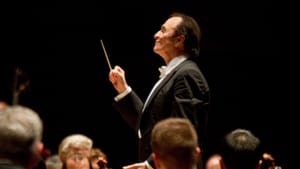Stay in the Loop
BSR publishes on a weekly schedule, with an email newsletter every Wednesday and Thursday morning. There’s no paywall, and subscribing is always free.
Charles Dutoit conducts a powerful 'Requiem'
The Philadelphia Orchestra presents Benjamin Britten's 'War Requiem'

To paraphrase Thomas Paine, these are indeed times that try our souls. A government that represents a minority of the people beefs up military spending while slashing funding for the arts, humanities, and preservation of the planet. Though it's early spring, the world is still grey and bare. It’s Lent, a season of atonement and sacrifice. Is this or is it not the perfect time for a performance of Benjamin Britten’s War Requiem?
Arguably the 20th-century British composer’s greatest work, the piece is seldom performed. It requires a large ensemble and demands of its audience advance preparation and undivided attention. In a world of sound bites and Twitter edicts, the War Requiem commands an hour and a half of total concentration. Though a mammoth undertaking, it’s not severe or austere. Viewed another way, it is shorter than most operas and tightly knit, without a single superfluous note. It crackles with energy and musical surprises, and juxtaposes some of the most ethereal, heartbreaking, and exultant music in the classical repertoire.
A massive undertaking
Last weekend, the Philadelphia Orchestra, under conductor laureate Charles Dutoit, met the challenge. In Verizon Hall, the orchestra was joined by a chamber orchestra, the Fred J. Cooper memorial organ, the Westminster Symphonic Choir under the direction of Joe Miller, the American Boychoir under Fernando Malvar-Ruiz, and three soloists: Tatiana Pavlovskaya, soprano; Steve Davislim, tenor; and Matthias Goerne, baritone.
The 103 members of both orchestras stretched the entire width of the stage, with the 160-member choir in the first tier above them; in the second tier, 31 boychoir members in white shirts stood still with arms at their sides like Irish step dancers. The black-clad choristers held open music books, whose white pages in profile gave the impression of dozens of doves fluttering above the stage.
The War Requiem was composed for the opening of the rebuilt Coventry Cathedral in 1962. The original 14th-century structure had been destroyed by bombing during World War II. Britten was haunted by many war-related themes as he accepted and pondered his commission: the words of the poet Wilfred Owen, who was killed in the final days of World War I; other men—friends and colleagues—who did not return from World War II; and the death of Gandhi, a pacifist like himself.
Bugles sang
Ultimately, the composer decided to intersperse sections of the Latin Requiem for the Dead with Owen’s war poems. This results in six sections of startling originality and variety.
The Dies Irae section exemplifies Britten’s integration of the text with the variety of musical resources. This movement has nine episodes, beginning with bold sallies by the trumpets and some of the most beautiful brass playing imaginable. Special praise goes to trumpet soloists David Bilger, Anthony Prisk, Jeffrey Curnow, and Robert Earley. Goerne’s rich baritone took a gentle approach to Owen’s words, which begin, “Bugles sang, saddening the evening air / And bugles answered, sorrowful to hear…” with woodwind effects reminiscent of the sea interludes of Britten’s opera, Peter Grimes. Few composers write so eloquently for harp, and the orchestra’s principal harpist, Elizabeth Hainen, did every note justice.
Britten is sometimes referred to as “listenable,” as though that were a fault, and “conservative,” because his music did not cut ties with traditional forms of expression. However, he was an original and a master of his highly developed craft. Sometimes voluptuous, other times anguished and sharp, his War Requiem appeals to the mind, the heart, and also the spiritual depths, where we wrestle with our own mortality and that of all living things.
Its conclusion, on the texts “Let us sleep now” and “Into Paradise may the Angels lead thee,” was, without the slightest tinge of sentimentality, almost unbearable in its beauty. To this listener, Dutoit’s interpretation and the performances of so many talented musicians and singers were well-nigh flawless, turning a service for the dead into a celebration of life and a plea for peace like no other.
What, When, Where
War Requiem. By Benjamin Britten. Charles Dutoit, conductor; Tatiana Pavlovskaya, soprano; Steve Davislim, tenor; Matthias Goerne, baritone; Westminster Symphonic Choir, Joe Miller, conductor; American Boychoir, Fernando Malvar-Ruiz, conductor. The Philadelphia Orchestra. March 23-25, 2017, at the Kimmel Center's Verizon Hall, 300 S. Broad Street, Philadelphia. (215) 893-1999 or philorch.org.
Sign up for our newsletter
All of the week's new articles, all in one place. Sign up for the free weekly BSR newsletters, and don't miss a conversation.

 Linda Holt
Linda Holt